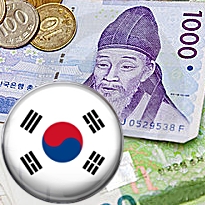 In order to snare a bigger slice of the Asian casino pie, South Korea is embarking on a mammoth leisure and gaming destination project in Incheon city, just west of the capital Seoul. If anyone doubted to whom the project was intended to appeal, the project will operate under the name 8City and will even be shaped like the number 8, which is considered a fortunate number in China. 8City will be built on Yongyu-Muui Island near Incheon International Airport and will eventually cover 80 square kilometers – more than three times the size of Macau, the region’s number one gambling enclave. In addition to casinos, 8City will offer hotels, retail shops, theme parks, ski slopes, a marina and a Formula 1 racetrack.
In order to snare a bigger slice of the Asian casino pie, South Korea is embarking on a mammoth leisure and gaming destination project in Incheon city, just west of the capital Seoul. If anyone doubted to whom the project was intended to appeal, the project will operate under the name 8City and will even be shaped like the number 8, which is considered a fortunate number in China. 8City will be built on Yongyu-Muui Island near Incheon International Airport and will eventually cover 80 square kilometers – more than three times the size of Macau, the region’s number one gambling enclave. In addition to casinos, 8City will offer hotels, retail shops, theme parks, ski slopes, a marina and a Formula 1 racetrack.
Developer EightCity Co. says initial construction is expected to start next year. EightCity’s shareholders, which include hotel operator Kempinski AG, Korean Air Lines and Daewoo Engineering and Construction., hope the project will attract up to $290b (US) in investment by the time it’s fully developed in 2030, along with 134m visitors per year. EightCity vice-chairman Park Seong-Hyun says the project has already secured $2.8b from local investors and a further $1b from Britain’s Sanbar Development Corp.
South Korea has 17 casinos, only one of which (Kangwon Land) permits locals to gamble. South Korea has long desired to ramp up its casino business, but financial regulations made many foreign investors skittish about taking the plunge. Travel Daily News Asia reports that on September 18, the government announced revisions to laws surrounding free economic zones (FEZ) that dramatically lowered the bar for investors. Gone is the requirement to make an upfront outlay of US $300m before one could even apply for a gaming permit, replaced by a $50m upfront investment, with a requirement to spend (at least) a further $450m within four years of receiving a gaming permit. The Ministry of Culture, Sports and Tourism is promising to process license applications within 60-90 days.
Foreign investors must still hold a credit rating of BBB or higher and have equity capital equal to at least 10% of the project’s total cost. But whereas the previous regulations required investors to have realized a net profit in at least two of three previous years and maintain a debt ratio less than 150% of the industry average, companies will now have to meet only one of those two requirements. We like to think of this as the Caesars Entertainment clause, since the debt-laden and profit-free casino firm has already expressed keen interest in the Incheon project, as has Universal Entertainment honcho Kazuo Okada (who is also building a casino in Manila’s Entertainment City project).
Of course, South Korea is hardly alone in its desire to lure throngs of free-spending Chinese gamblers into its gaming dens. Macau, the Philippines, Australia, Vietnam, Taiwan, Russia, Laos, Cambodia – hell, even Las Vegas – are all competing for the same customers. While Sheldon Adelson is of the opinion that the Asian market won’t be satisfied in our lifetime, history suggests that all booms eventually bust. Thankfully, a Chinese think tank has ridden to the rescue. The China Development Research Foundation says its time China ended its controversial three-decade-old one-child policy and allow Chinese families in certain provinces to have two children by 2015, with the revision applying to the entire country by 2020. At that rate, the first wave of this new generation will be eligible to visit 8City just six years after it’s completed. Ah, synergy…